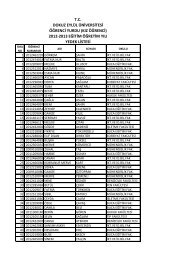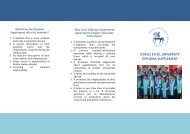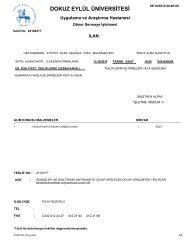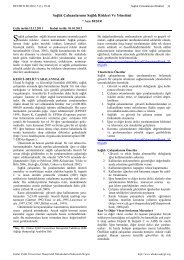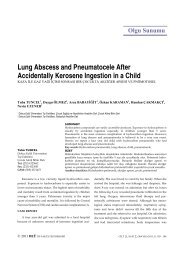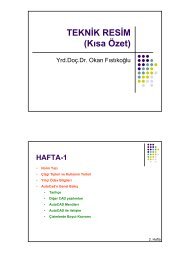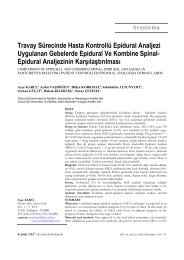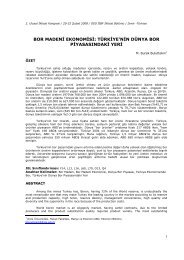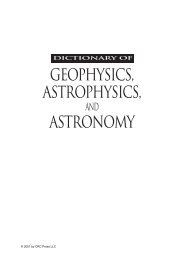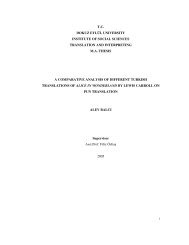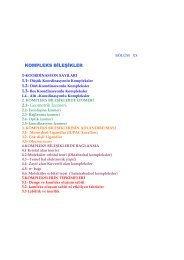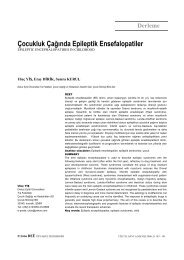the ideology of lexical choices in the turkish translations of oliver twist
the ideology of lexical choices in the turkish translations of oliver twist
the ideology of lexical choices in the turkish translations of oliver twist
You also want an ePaper? Increase the reach of your titles
YUMPU automatically turns print PDFs into web optimized ePapers that Google loves.
1.2.1. CDA and Ideology<br />
1.2.1.1. What is CDA?<br />
CDA is an <strong>in</strong>terdiscipl<strong>in</strong>ary approach to <strong>the</strong> study <strong>of</strong> discourse, which views<br />
"language as a form <strong>of</strong> social practice" (Fairclough 2001; 20). It is a relatively new<br />
trend <strong>of</strong> research. Ow<strong>in</strong>g to CDA, <strong>the</strong> study <strong>of</strong> language has become an<br />
<strong>in</strong>terdiscipl<strong>in</strong>ary tool. Thus, it has come to be used by researchers from multiple<br />
backgrounds. Norman Fairclough, Teun A. van Dijk, Christ<strong>in</strong>a Schäffner, Ruth<br />
Wodak, and Roger Fowler are some <strong>of</strong> <strong>the</strong> notable researchers <strong>of</strong> <strong>the</strong> field. The<br />
issues that CDA addresses <strong>in</strong>clude − but are not limited to − power, hegemony, class,<br />
gender, race, discrim<strong>in</strong>ation, social order and structure, and <strong>ideology</strong> (Van Dijk,<br />
2001; 354). In Language, Power and Ideology (1989), Ruth Wodak associates <strong>the</strong><br />
field with “critical l<strong>in</strong>guistics,” and def<strong>in</strong>es it as “an <strong>in</strong>terdiscipl<strong>in</strong>ary approach to<br />
language study with a critical po<strong>in</strong>t <strong>of</strong> view” for <strong>the</strong> purpose <strong>of</strong> study<strong>in</strong>g “language<br />
behavior <strong>in</strong> natural speech situations <strong>of</strong> social relevance (quoted <strong>in</strong><br />
http://pioneer.netserv.chula.ac.th/~schavali/lesson2.htm). Therefore, CDA regards<br />
language as a sort <strong>of</strong> social practice, and is ma<strong>in</strong>ly concerned with <strong>the</strong> study <strong>of</strong> it<br />
with<strong>in</strong> a critical framework.<br />
1.2.1.2. How Ideology Relates to CDA<br />
As has been previously mentioned, CDA adopts a critical approach to <strong>the</strong><br />
study <strong>of</strong> language. S<strong>in</strong>ce <strong>ideology</strong> manifests itself <strong>in</strong> language, <strong>the</strong> ways <strong>in</strong> which<br />
ideological mean<strong>in</strong>gs are embedded <strong>in</strong> language falls with<strong>in</strong> <strong>the</strong> scope <strong>of</strong> CDA. As a<br />
matter <strong>of</strong> fact, as Ti<strong>in</strong>a Puurt<strong>in</strong>en states, “CDA aims at reveal<strong>in</strong>g how <strong>ideology</strong><br />
affects l<strong>in</strong>guistic <strong>choices</strong> made by a text producer and how language can be used to<br />
ma<strong>in</strong>ta<strong>in</strong>, re<strong>in</strong>force or challenge ideologies” (2000; 178). As underl<strong>in</strong>ed <strong>in</strong> this<br />
quotation, <strong>the</strong> l<strong>in</strong>guistic <strong>choices</strong> made by text producers − <strong>in</strong>clud<strong>in</strong>g authors and<br />
translators − are not accidental at all. That is to say, <strong>the</strong>se <strong>choices</strong> express a certa<strong>in</strong><br />
ideological stance on <strong>the</strong> part <strong>of</strong> <strong>the</strong> text producers. CDA <strong>of</strong>fers a framework which<br />
uncovers this ideological content as well as <strong>the</strong> ways <strong>in</strong> which <strong>ideology</strong> is<br />
constructed and re<strong>in</strong>forced <strong>in</strong> texts. For <strong>in</strong>stance, CDA helps analysts identify <strong>the</strong><br />
l<strong>in</strong>guistic manifestations <strong>of</strong> <strong>ideology</strong> <strong>in</strong> a text through an analysis <strong>of</strong> <strong>lexical</strong> units.<br />
5



